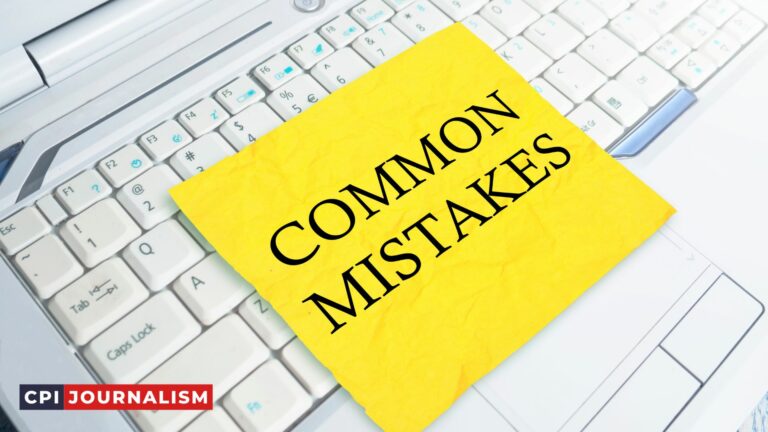What Are the Best Practices for Researching and Reporting on Sensitive or Controversial Topics in Investigative Journalism?
As an experienced journalist, I understand the difficulty and sensitivity of researching and reporting on sensitive or controversial topics in investigative journalism.
It is important to handle such topics with care, and follow the best practices to ensure accuracy and fairness.
In this article, I will share my knowledge and experience to help upcoming journalists conduct research and report responsibly on sensitive and controversial topics.
I will go through the best practices for researching and reporting on sensitive and controversial topics in investigative journalism.
A. Definition of Sensitive or Controversial Topics
As an experienced investigative journalist, I believe it is important to have an understanding of what constitutes sensitive or controversial topics before attempting to research and report on them.
Sensitive or controversial topics can refer to any subject that has the potential to generate strong emotions and/or provoke debate, whether it be in the form of political and social issues, or even personal matters.
The topics that are considered sensitive or controversial can vary depending on the context and the audience.
For example, a topic such as abortion might be considered sensitive in a religious community, while a topic such as gun control might be considered controversial in a political context. Similarly, topics such as poverty or racism can be considered sensitive in a cultural context.
Therefore, it is important to be aware of the potential sensitivity and controversy that these topics can generate in order to ensure that research and reporting on them is carried out in a responsible and ethical manner.
II. Best Practices for Researching Sensitive or Controversial Topics
For investigative journalists researching and reporting on sensitive or controversial topics, there are a few best practices to keep in mind.
1. Prepare Yourself: Before launching into a sensitive or controversial topic, it’s important to prepare yourself.
Researching these topics can be emotionally and psychologically taxing, so it’s important to build up your resilience and have an understanding of what you may be exposed to. Speak to a trusted professional, such as a psychologist, if necessary.
2. Develop a Comprehensive Understanding: In researching a sensitive or controversial topic, be sure to gain an in-depth understanding of it.
Read up on the topic extensively, both from primary and secondary sources, and be sure to consult experts. This will help you to gain an informed and unbiased perspective on the issue.
3. Take Your Time: Researching and reporting on sensitive or controversial topics can take a long time. Don’t rush through the process or be tempted to take shortcuts.
Take your time to ensure that you have developed a comprehensive and informed understanding of the topic.
4. Ensure Accuracy: When researching a sensitive or controversial topic, accuracy is of the utmost importance.
Double-check all facts and figures and make sure that they are correct. If in doubt, consult with an expert to verify the information.
5. Respect Relevant Laws and Regulations: When researching a sensitive or controversial topic, make sure to respect any relevant laws and regulations.
For example, if you are researching a topic related to national security, be sure to adhere to the relevant laws and regulations regarding the protection of classified information.
6. Be Sensitive: When researching and reporting on sensitive or controversial topics, it is vital to be sensitive towards those affected. Be respectful of their experiences and be aware that you may be dealing with people who have suffered trauma.
By following these best practices, investigative journalists can ensure that they are researching and reporting on sensitive or controversial topics in an ethical and responsible manner.
A. Establish A Clear Goal
As an investigative journalist, it is essential to establish a clear goal when researching and reporting on sensitive or controversial topics.
Having a clear goal will ensure that your research and reporting are focused on providing the public with meaningful and accurate information.
Before you begin your research, ask yourself, “What story am I trying to tell?” Consider all aspects of the story, such as the potential implications and consequences of the story, as well as the potential impact on the public.
Be sure to focus on the information that is most relevant to your story, and avoid including information that is not necessary or irrelevant.
Once you have established your goal, create an outline or a plan of action. This will help you organize your research and reporting, and ensure that you are on track to achieving your goal.
Be sure to include a timeline and a list of sources to contact. This will help you stay on track and ensure that you are able to thoroughly research and report on the topic in a timely manner.
By establishing a clear goal and following a plan of action, you will be able to ensure that your research and reporting are focused and effective.
This will help you provide the public with meaningful and accurate information about sensitive or controversial topics.
B. Research Thoroughly
As an experienced journalist, I can attest that thorough research is one of the most important steps when it comes to reporting on sensitive or controversial topics in investigative journalism.
When researching a topic, it’s important to consider all sides of the issue and to be open to all possibilities. Interviews are a great way to gain insight into the issue and to get perspectives from both sides.
It’s important to make sure you talk to a variety of sources who have different views and perspectives. It’s also important to make sure that all sources are treated with respect and that their opinions are listened to without making judgement.
When researching, it’s also important to fact-check your information. The best way to do this is to look for reputable sources that have already done the research and have published their findings.
This could include academic studies, reports from credible research organizations, or articles from reliable news outlets. It’s also important to double-check all your facts and make sure they are accurate and up-to-date.
Finally, it’s important to take a critical look at the data and sources you are using. Make sure that the data is reliable, and that the sources you are using are trustworthy.
Consider any potential biases that may be influencing your sources and make sure to consider all information objectively.
Thorough research is essential when it comes to reporting on sensitive or controversial topics in investigative journalism.
Doing your research carefully and taking a critical look at the data and sources you are using will help ensure that your reporting is accurate and trustworthy.
1. Utilize Multiple Sources:
One of the best practices for researching and reporting on sensitive or controversial topics in investigative journalism is to make use of multiple sources.
By seeking out and utilizing multiple sources, journalists can ensure that their reporting is well-rounded and comprehensive.
It is important to reach out to individuals and organizations who may have different perspectives and biases on the topic in question.
This can include interviewing those involved, conducting in-depth research, and seeking out experts in the field. Additionally, journalists should strive to use primary sources whenever possible, such as documents, emails, and other materials related to the topic.
By utilizing multiple sources and primary materials, journalists can ensure that their reporting is accurate, comprehensive, and balanced.
2. Utilize Primary Sources
One of the best practices for researching and reporting on sensitive or controversial topics in investigative journalism is to utilize primary sources.
Primary sources are direct sources of information, such as eyewitness accounts, interviews, documents, audio/video recordings, photographs, and so on.
By using primary sources, journalists can ensure that the information they are reporting on is accurate and up-to-date.
For example, if the topic being investigated is police brutality, it is important for the journalist to speak directly with witnesses, victims, and anyone else who may have information about the incident.
This will allow the journalist to gain a better understanding of the incident and provide more accurate reporting.
In addition to speaking with witnesses and victims, it is also important for journalists to review any supporting documents that may be available.
This could include police reports, court documents, and other official records. By reviewing these documents, the journalist can gain an even more comprehensive understanding of the incident and provide more comprehensive reporting.
Finally, when researching sensitive or controversial topics, it is important for journalists to remain objective and impartial.
The journalist should never take sides or express their opinion on the topic. Instead, they should focus on providing an accurate and unbiased account of the incident.
3. Utilize Secondary Sources
When researching and reporting on sensitive or controversial topics in investigative journalism, it is important to use secondary sources.
Secondary sources are those which provide information about a topic from a different perspective than primary sources.
They can be used to supplement and verify primary sources, or to provide additional context and insight on a topic.
In order to ensure accuracy and objectivity, journalists should strive to use multiple secondary sources when researching and reporting on sensitive or controversial topics.
It is important to utilize multiple sources in order to get multiple perspectives on a topic, in order to verify information, and to check for any potential bias.
When utilizing secondary sources, it is important to evaluate the sources for accuracy, objectivity, credibility, and relevance.
Sources should be carefully evaluated to ensure that they are reliable and trustworthy. Furthermore, the relevance of the source should be taken into account.
For example, if a topic relates to a certain geographical region, then sources from that region should be given priority.
In addition to using multiple secondary sources, it is also important to use primary sources when researching and reporting on sensitive or controversial topics.
Primary sources provide firsthand accounts and direct evidence of the topic being researched. This type of evidence is invaluable for investigative journalism as it provides an accurate and reliable representation of the topic being researched.
Overall, when researching and reporting on sensitive or controversial topics in investigative journalism, it is important to utilize multiple secondary sources and primary sources in order to ensure accuracy and objectivity.
Careful evaluation of sources is paramount in order to ensure that the information provided is reliable and trustworthy.
C. Verify Information
Verifying information is a crucial step in investigative journalism and should be done at every stage of the research process.
It is important to double-check any information that is presented to you, and to make sure the facts presented are accurate and correct.
To verify the information collected, journalists should use a variety of methods. This includes interviewing experts, conducting background research, visiting relevant sites, and cross-referencing information with other sources.
It is also important to read and review the information presented to ensure accuracy and consistency.
Journalists should also verify the credibility of their sources. Sources should be contacted to verify the accuracy of the information they are providing and to ensure that their credibility is unassailable.
Furthermore, journalists should be aware of any potential conflicts of interest or biases that their sources may have.
Finally, journalists must verify the claims made by their sources. This can be done through the use of public records, court documents, and other available resources.
By verifying the claims from multiple sources, journalists can ensure that the information they are presenting is accurate and reliable.
D. Consider Ethical Implications
Investigative journalism is an important tool for exposing wrongdoings and bringing the truth to light. However, it is important to be aware of the ethical considerations that come with researching and reporting on sensitive or controversial topics.
When investigating and reporting on sensitive topics, journalists must be mindful of their ethical responsibilities.
This includes being aware of the potential consequences of their reporting, as well as their responsibility to remain impartial and objective in their coverage.
Journalists should also be aware of the potential for bias or harm to their sources, as well as any potential repercussions for their own safety or reputation.
Journalists should also take steps to ensure that their research is conducted ethically. This includes ensuring that sources are treated fairly and that any information gathered is accurate and verifiable.
Journalists should also take steps to protect their sources and ensure that the information they obtain is not used for malicious purposes.
When reporting on sensitive topics, it is important for journalists to consider the ethical implications of their work. By doing so, they can ensure that their reporting is fair, accurate, and respectful of their sources.
Best Practices For Reporting On Sensitive Or Controversial Topics
Reporting on sensitive or controversial topics requires both a thorough understanding of the subject matter and an approach that is guided by ethical considerations.
As an experienced investigative journalist, I have a few best practices that I rely on to ensure my reporting is accurate, unbiased, and responsible.
First and foremost, it is important to be aware of the potential for bias and to take steps to avoid it. This means being critical of sources and checking for any potential conflicts of interest.

It also means being open to different perspectives and not taking any one viewpoint for granted. When it comes to sensitive or controversial topics, it is often best to speak to a variety of sources from different backgrounds and perspectives to get a comprehensive understanding of the issue.
Furthermore, it is important to be aware of the potential for harm that can come from reporting on sensitive or controversial topics.
This includes considering the implications of reporting on someone or something, as well as considering the potential consequences of publishing information that could be potentially damaging to a person or group.
In cases like these, it is important to be extra vigilant and take steps to protect those involved.
Overall, it is important to approach sensitive or controversial topics with sensitivity and care. By doing so, not only can journalists produce accurate and responsible reporting, but they can also help bring attention to important issues and contribute to meaningful conversations.
A. Consider The Impact Of Your Reporting
As an investigative journalist, it is important to remember that the stories you write can have a major impact on people’s lives.
Before you begin researching and reporting on sensitive or controversial topics, you should take the time to consider the potential impact of your reporting.
First and foremost, you should think about how your reporting might affect the subjects of your story.
It is important to consider the potential for harm to those individuals and their families. You should also think about how your reporting might affect the community around the subjects of your story.
Second, you should think about the potential for your reporting to cause further harm. This might include the potential for your reporting to fuel hatred, violence, or other negative reactions.
It is important to be mindful of the potential for your reporting to have a negative impact on vulnerable or marginalized populations.
Finally, you should think about the potential for your reporting to cause positive change. It is important to consider the potential for your reporting to bring about awareness and understanding, and to create a dialogue that leads to positive change.
By taking the time to consider the potential impact of your reporting, you can make sure that you are doing responsible, ethical journalism.
This will help to ensure that your reporting has a positive impact on those affected by it.
B. Be Respectful
When researching and reporting on sensitive or controversial topics in investigative journalism, it is essential to be respectful of the subject matter.
Respect for the people involved in the story should be paramount. Showing respect means taking the time to understand what is being covered, allowing people to tell their stories, and being mindful of how the information is presented.
It is also important to be aware of the potential impact of the story and the potential consequences of reporting on it.
Respectful research means not sensationalizing the story or subject matter, or using inflammatory language or language that is demeaning or derogatory.
Be aware of the power of the media and the influence it can have on the people involved. Respectful research and reporting should be sensitive to the feelings of those involved and should strive to present their stories accurately and fairly.
Finally, it is important to be aware of the legal implications of reporting on sensitive or controversial topics.
Always check the accuracy of the facts and ensure that the information is reported in a legal and ethical manner. Respectful investigative journalism should be guided by the principles of truth, accuracy, fairness and balance.
C. Be Objective
When researching and reporting on sensitive or controversial topics in investigative journalism, it is important to be objective and to take a neutral stance.
As an experienced investigative journalist, I have found that it is important to weigh both sides of the argument and to present all sides of the story fairly.
It is essential to be unbiased and to not allow personal opinions or biases to influence the research and reporting process.
It is also important to remain open-minded and to be willing to consider alternate points of view. As an investigative journalist, it is important to look at the facts objectively, without allowing emotions or preconceived notions to cloud judgement.
It is essential to remain rooted in facts, not conjecture, and to present information accurately and without bias.
It is also important to be mindful of the potential impacts of the story. Investigative journalism can have powerful effects and it is important to consider how the story might impact the people involved.
It is important to be respectful of sources and to be aware of the potential consequences of the story.
Finally, it is important to be honest and transparent about the sources used for the story. It is essential to be transparent about the sources used and to provide accurate information about them.
This will ensure that the story is seen as credible and that the audience can trust the information presented.
D. Be Accurate
Accuracy is paramount when researching and reporting on sensitive and controversial topics in investigative journalism.
As an experienced journalist, I can’t stress enough the importance of accuracy in all aspects of research and reporting. To ensure accuracy in your work, here are some tips and best practices:
• Double check all sources and information. Make sure you have multiple sources and verify any statements made by them. If possible, check the accuracy of information from primary sources.
• Get a second opinion. Ask another experienced journalist to review your work and verify facts before publishing.
• Take your time. Don’t rush to publish; take the time to make sure all facts are accurate before you publish.
• Fact-check. Have another person fact-check your work before you publish to ensure accuracy.
• Avoid assumptions. Don’t make assumptions, but rather base your reporting on facts and evidence.
• Watch out for bias. Be aware of any potential bias in your research and reporting, and try to present all sides of the story.
These tips will help you ensure accuracy in your investigative journalism. If you take the time to double check sources, get a second opinion, and fact-check your work, you can be confident in the accuracy of your reporting.
E. Consider The Audience
As an experienced investigative journalist, one of the most important considerations when researching and reporting on sensitive or controversial topics is to think about the audience.
While it’s important to tell the story accurately, it’s also imperative to recognize the potential impact of the story on the audience.
Before taking on a sensitive or controversial topic, consider the different perspectives of the audience and determine the best way to approach the story.

Consider the potential impact that the story may have on the audience and determine if there are ways to mitigate any negative effects.
In addition, it is important to consider the language and tone that will be used in the story. The language and tone should be respectful, appropriate, and sensitive to the topic and the audience.
It is also important to consider the reaction of the audience to the story and how to address any criticism or misunderstandings.
Finally, consider the platform and medium through which the story will be distributed. Is it appropriate for the topic, audience, and potential impact of the story?
Does the medium provide the necessary resources and tools to accurately portray the story?
By taking the time to think about the audience and consider their perspectives, stories on sensitive or controversial topics can be reported in a way that is accurate, informative, and respectful.
F. Use Appropriate Language
One of the most important aspects of researching and reporting on sensitive or controversial topics in investigative journalism is the language you use.
It is important to use language that is respectful and non-inflammatory, as inflammatory language can make readers feel uncomfortable or even angry.
When writing about sensitive or controversial topics, it is important to use language that is neutral and objective. To do this, avoid using emotionally charged words or phrases, and instead opt for more neutral words.
For example, when discussing a political issue, rather than saying something is “wrong” or “bad”, it can be better to phrase it as “controversial” or “divisive”.
It is also important to be aware of the connotations of certain words and phrases, and to be mindful of any potential biases that may be present in the language you use.
It can be tempting to use words that reflect your own opinion, but this can be seen as unprofessional and can make readers feel uncomfortable.
In addition, when researching sensitive or controversial topics, it is important to be mindful of the language used by any sources you interview.
It is important to ensure that the language used does not offend any readers and is not inflammatory. If necessary, you may need to edit quotes from sources to ensure that they are appropriate for the article.
Finally, when writing about sensitive or controversial topics, it is important to be aware of any potential cultural sensitivities or language that could be offensive to certain groups of people.
It is important to be respectful of different cultures and to strive for inclusivity in your language.
By using neutral and objective language, being aware of connotations and potential biases, and being mindful of any cultural sensitivities, you can ensure that your language is appropriate and respectful when researching and reporting on sensitive or controversial topics.
Conclusion
Investigative journalism is an important tool for exposing truths and uncovering issues that are often difficult to discuss. Researching and reporting on sensitive or controversial topics requires a great deal of careful consideration and thought.
Utilizing best practices for researching and reporting on such topics can help ensure a journalist’s work is accurate and ethical.
First and foremost, it is important to ensure that the sources used are credible and reliable. Journalists should also take the time to interview a variety of sources and consider multiple perspectives.
Additionally, it is important to remain objective and unbiased when reporting on sensitive or controversial topics. Furthermore, it is essential to verify information before publishing and to take into account any potential legal issues.
Finally, journalists should take into account the potential impact their stories may have and ensure that the coverage is sensitive and respectful.
By following these best practices, journalists can ensure that their work is accurate and ethical, as well as beneficial and informative for the public.
A. Summary of Best Practices
1. Develop a Comprehensive Plan: Before taking on a sensitive or controversial investigative journalism project, it is essential to create a plan that outlines the research process and reporting strategy.
This plan should consider the unique ethical and safety considerations associated with the topic, as well as the available resources and timeline.
2. Establish Trust: Establishing trust with sources is key to successful investigative journalism. This can be achieved through careful listening, careful questioning, and ensuring that sources feel comfortable and safe.
3. Practice Confidentiality: Confidentiality is essential when researching sensitive or controversial topics. Sources should be aware that their identities will be protected and information will be kept confidential.
4. Exercise Caution: It is important to be aware of the potential consequences of reporting on sensitive or controversial topics. For example, journalists should be aware of the potential for legal action or physical danger.
5. Understand the Risks: Journalists should understand the risks associated with reporting on sensitive or controversial topics. This includes understanding the laws and regulations that may apply and being aware of potential threats.
6. Vet Your Sources: It is important to verify the credibility of all sources. Sources should be carefully vetted to ensure they are reliable and trustworthy.
7. Verify Information: Journalists should verify all information reported, and ensure accuracy and fairness. Journalists should also be aware of potential bias and false information.
8. Maintain a Professional Distance: It is important to maintain a professional distance from sources and the topic being reported on. This will ensure the journalist is able to remain impartial and objective.
9. Document Everything: It is essential to document all research and reporting. This includes keeping detailed notes and records and maintaining accurate records of all communication.
B. Importance Of Investigative Journalism
Investigative journalism plays a vital role in uncovering and exposing the truth, holding corporations and governments accountable, and advocating for social justice.
Through in-depth research and reporting, investigative journalists are able to uncover information that would otherwise remain hidden.
They provide a unique and invaluable service to the public, uncovering injustices and informing the public about important issues.
Investigative journalism is an essential tool for democracy, as it helps to ensure that the public is adequately informed and that public officials are held accountable for their actions.
By engaging in thorough research and reporting, investigative journalists can uncover information that would otherwise remain hidden.
This information can then be used to inform public policy decisions, hold the powerful accountable, and help to protect vulnerable members of the public.
Investigative journalism also serves to protect the public from harm, as it can uncover dangerous working conditions, environmental hazards, and other potential harm.
By uncovering this information, investigative journalists can help to ensure that the public is adequately protected from potential harm.
Investigative journalism can also help to promote social justice, as it can help to expose systemic injustices and raise awareness about important issues.
By engaging in in-depth research and reporting, investigative journalists can help to bring attention to the plight of marginalized communities, helping to foster greater understanding and empathy.
Ultimately, investigative journalism is an essential tool for democracy. By engaging in thorough research and reporting, investigative journalists can help to ensure that the public is adequately informed and that public officials are held accountable for their actions.
Through their work, investigative journalists can help to protect the public from harm, promote social justice, and ensure that the public is adequately informed.
C. Final Thoughts
Investigative Journalism is a necessary tool for uncovering and reporting on sensitive or controversial topics. As an experienced journalist, I want to leave you with a few final thoughts that can help you in your research and reporting.
First, always approach your research and reporting with the utmost respect and caution. Sensitive or controversial topics can be difficult to navigate and are often fraught with potential risks.
As a result, it’s important to ensure that you have done your due diligence and have all of the facts before proceeding.
Second, as an investigative journalist, it’s essential to be mindful of the potential implications of your work. Your research and reporting can have a powerful impact on society, and it’s important to be aware of potential consequences of your work.
Finally, always be prepared to defend your research and reporting. Investigative journalism is often met with skepticism and criticism, so it’s important to be prepared to back up your claims with facts and evidence.
By following these best practices for researching and reporting on sensitive or controversial topics, you can ensure that your work is accurate, ethical, and responsible.
As an experienced journalist, I have seen firsthand the power of investigative journalism and the potential for it to make a positive impact on society. I encourage you to use your voice to uncover and report on important issues.







